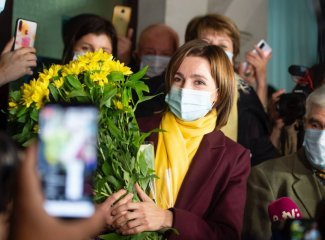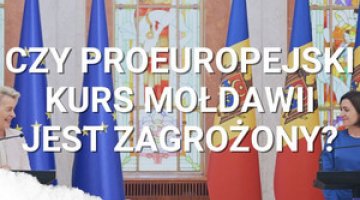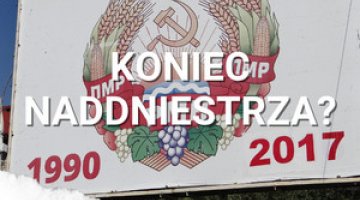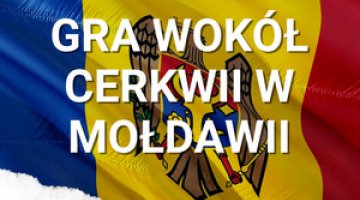Maia Sandu wins the presidential election in Moldova

Maia Sandu, the former Moldovan prime minister and the leader of the pro-Western Action and Solidarity Party (PAS), won the second round of the presidential election in Moldova held on 15 November, with 57.75% of the vote. Her rival Igor Dodon, the outgoing president and the informal leader of the pro-Russian Party of Socialists of the Republic of Moldova (PSRM) won 42.25% of the vote. The turnout was 52.78%, with up to 15% of all the ballots cast coming from the nearly one million Moldovan voters who have emigrated from the country. Despite minor incidents (such as attempts to block access to polling stations for Moldovans from Transnistria) it seems the election was fair and went off without major disruptions. Sandu has already received the first congratulations from abroad, including from Russian President Vladimir Putin.
Commentary
- The surprisingly good result for Sandu is due above all to a record mobilisation of the Moldovan diaspora. Outside Moldova (mainly in the EU, the UK and the US) over 260,000 Moldovans voted in the election, and 93% of them supported the PAS leader. This indicates that a quarter of the votes cast for Sandu came from abroad. Interest in voting was so high that some polling stations ran out of ballots (this was the case in London and Frankfurt-am-Main), which led to protests from the people waiting to cast their votes. Sandu also succeeded in rallying voters within the country, since turnout in the second round was 10 percentage points higher than in the first one.
- The key to Sandu’s success was the electorate’s fatigue with the corruption prevalent in Moldovan politics and disappointment at Dodon’s presidency. The fact that Sandu received the support of populist Renato Usatîi, the charismatic President of ‘Our Party’ who is popular with the pro-Russian electorate, also had an influence on her victory. Usatîi, who has been highly critical of Dodon’s presidency, succeeded in depriving the outgoing president of a large portion of his support in the first round of the election (winning as much as 17% of the vote). As a result, many of those who voted for Usatîi in the first round decided not to vote in the second round, or to cast their vote for Sandu.
- The number of votes Dodon secured in the election should be seen as an underperformance. Even though the incumbent president had realised he could lose the election, he did not expect his rival to obtain so large an advantage over him. Dodon lost up to 17% of the vote compared to the second round of the 2016 election, in which he also ran against Sandu. His defeat was sealed by corruption charges, including hidden camera footage allegedly showing him accepting a bribe from the former oligarch Vlad Plahotniuc; another factor was his lack of success in containing the COVID-19 pandemic. Moldova is one of the hardest-hit countries in Europe, and the underinvested and understaffed health service has been unable to cope with the growing number of people infected. Nor did Dodon succeed in securing the support of the numerous Moldovan diaspora living in Russia (estimated at 500,000 people), which traditionally supports candidates who favour closer co-operation with Moscow. According to the official data, just under 14,000 of the Moldovans residing in Russia took part in the second round of the election, and this accounted for a mere 5% of all the votes coming from polling stations abroad. Furthermore, as many as 25% of those voters voted for Sandu. Dodon also failed to rally the support of the pro-Russian voters living in the separatist republic of Transnistria. Over 30,000 representatives of that group voted in the second round of the election (86% of whom voted for Dodon).
- There is no doubt that the incumbent president will attempt to challenge the result of the election, citing infringements of the regulations with regard to running the election campaign, or the organised transport of voters to polling stations outside the country, which is banned by law (those charges appeared in the media ahead of and during the second round), among other issues. Nevertheless, in the face of the predominance of the votes cast for Sandu, these attempts will come off as somewhat implausible and most likely ineffective.
- The President has very limited competences within the Moldovan political system; nevertheless, the victory for the former prime minister is predominantly important in terms of the image and reputation of both the country and PAS. It will strengthen the pro-European opposition in Moldova and further motivate its electorate. The fact that the PAS leader will become head of state will also enable the opposition to better supervise the government’s actions. Sandu’s presidency will improve Moldova’s co-operation with its Western partners and its immediate neighbours Romania and Ukraine. Dodon’s relations with Ukraine have been cold since 2016 when he stated that Crimea was a de facto part of Russia. The Ukrainian and Romanian presidents Volodymyr Zelensky and Klaus Iohannis have already presented their congratulations to Sandu.
- Even before the presidential elections, Dodon had announced that he would hold early parliamentary elections in 2021; however, in the face of the clear defeat for the informal leader of the PSRM, the party may no longer be interested in implementing this scenario. At present the PSRM has 37 seats in the 101-seat parliament, and risks losing a portion of them. It is very likely that in this situation the socialists will attempt to rebuild their majority in Parliament, as the incumbent president had already declared on 15 November. Even though this will be difficult, there has been speculation about alleged agreements between the socialists and representatives of the Şor Party and a group of deputies affiliated to Plahotniuc. Dodon’s defeat will affect his standing in the PSRM, and it is possible that the election result will encourage leading politicians from the party (above all the mayor of Chișinău, Ion Ceban) to stand for the party leadership in the near (but not immediate) future. As for the PAS, strengthened by Sandu’s victory, the party will call for parliamentary elections to be held as fast as possible.




